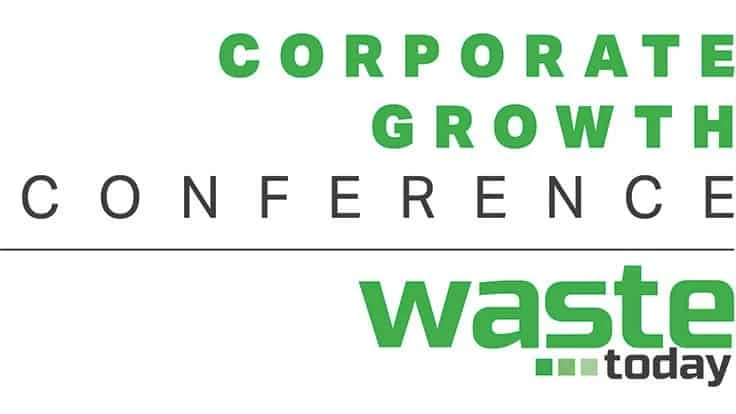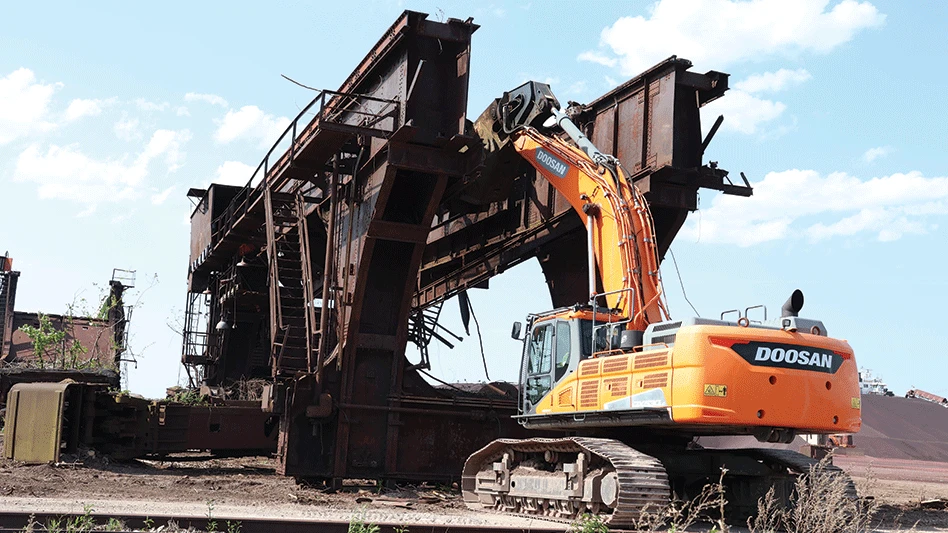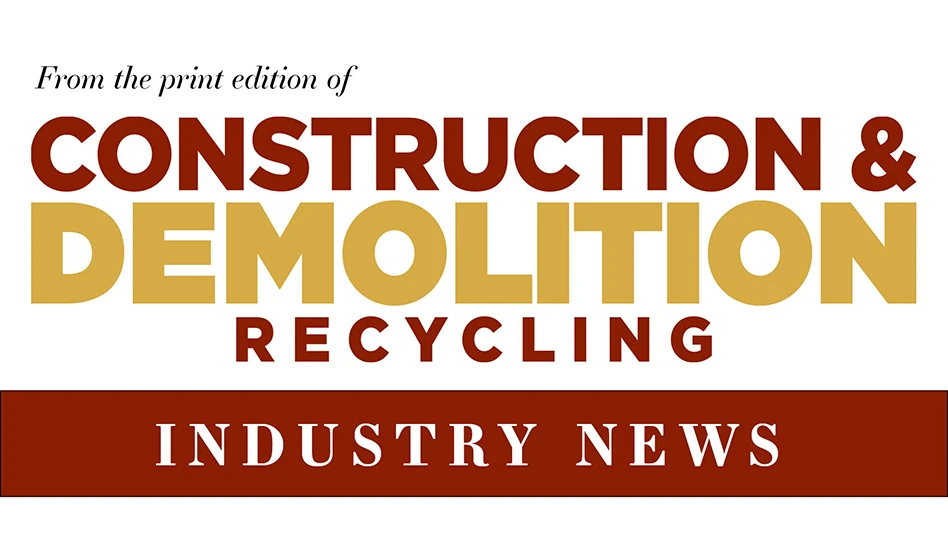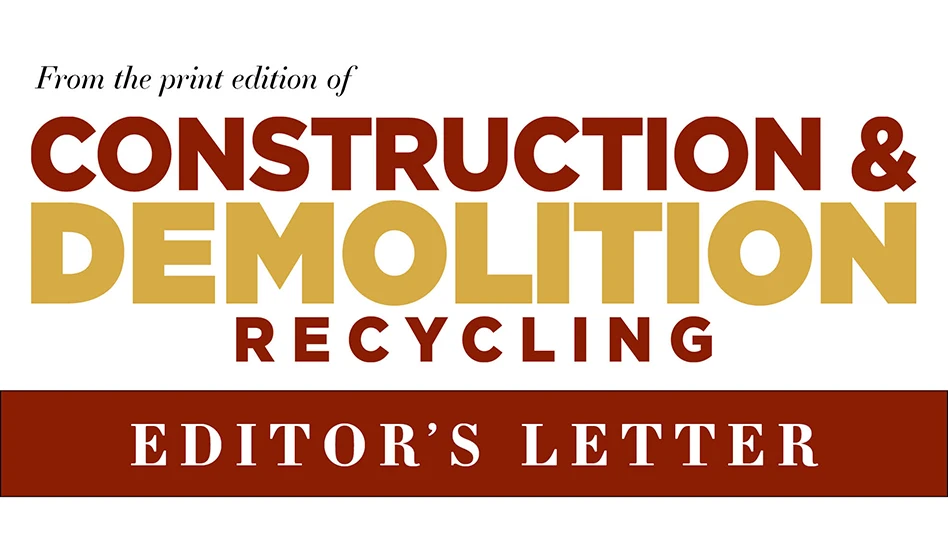
Waste Today’s Corporate Growth Conference, which was held as a virtual broadcast-style event on Oct. 14, brought waste management and environmental services operators together with leading investment bankers, private equity firms and other financial market participants to share business intelligence, operational best practices, and insights into the state of the waste market.
Although this year’s conference has wrapped, its seven sessions are available on demand for interested parties.
If you weren’t able to attend, here are a few highlights of what you missed.
Keynote: An Executive Perspective
As executive vice president and chief legal officer of Waste Management, Charles Boettcher shared his unique perspective on what it takes to run North America’s largest waste company. In this keynote “fireside chat” discussion, Charles shared Waste Management’s approach to M&A, the business segments the company is looking into expanding outside of its core business, where the future of waste is trending and what opportunities there are for innovation and disruption.
Boettcher on what Waste Management looks for from a culture perspective when evaluating companies for potential M&A deals:
“We’re people-first and [champion] safety, and those are our two biggest cultural elements, and if the company doesn’t have a really good safety record, that’s a big red flag for us because that’s something that takes a while to get corrected. … So, we look for a good safety culture. It also has legacy issues when the safety culture is bad in any aspects of the landfill or logistical elements of that business, so we look at [safety] probably first, and the rest you can deal with.”
Boettcher on the company’s appetite for large-scale M&A deals moving forward:
“We’re not seeing another deal like an Advanced Disposal in our core waste space that we could do. Look, it has taken us this long to get [to this point with] Advanced Disposal. In the near term, we’re certainly not eyeing something, and the market shouldn’t expect us to come around with another Advanced Disposal size, municipal solid waste/core industry deal for us. Now, could we do other deals? … There is a lot of activity around the core business that we’re looking at potential deals in.”
Boettcher on market disruption and the future of waste:
“We’ve looked at alternatives to landfill. Every time we do, we say, ‘The world should be reminded that landfill in the U.S. and North America today is a well-accepted means that is environmentally sensitive and a sustainable way to dispose of waste.’ For the foreseeable future, we still see that as a huge part of our mission to treat the environment the right way. … But long term, we are looking around the corner to see where the disruption could come from that would be better for the environment and something we could engage in that might disrupt our landfills, or make [how we operate today] nonexistent in 5, 10, 20 years, but we’re leaning in to make sure we’re there [assessing these opportunities]."
Market Dislocation: Where is the Market Post-Coronavirus?
Moderator Effram Kaplan, managing director for Brown Gibbons Lang & Co., led this session regarding the near- and long-term impacts of the novel coronavirus on the environmental services and waste markets. Panelists included Bob Cappadona, president and COO, Veolia North America; Pat Dovigi, founder and CEO, GFL Environmental; and David Stanton, president, Clean Earth.
Discussion topics included macro and structural changes in environmental services, volumes, competition, business models and more.
Dovigi on changes in volumes due to the pandemic:
“On a year over year average, volumes are probably up 2 to 5 percent on the municipal side, and commercial volumes, depending on the market, are still down anywhere between 5 and 10 percent. That’s really because schools are producing less volume; major office buildings are producing significantly less volumes; and restaurants, entertainment, [sporting events, etc, are producing less volumes].”
Stanton on permanent changes in commercial volumes:
“At some point, all that [commercial] transaction volume is still going to take place, I just think we’re going to see it take place differently. I think these are permanent changes. I think we have accelerated trends by 5 to 10 years in the retail space [thanks to COVID]. Things are migrating to ecommerce. In one quarter, ecommerce grew 20 percent, so that adoption rate went through the roof, and it’s never going back.”
Cappadona on regional shifts in activity:
“[At the outset of the COVID outbreak], we were dealing with some of the geographical issues. We saw a major impact in the New York/Tri-State area, while at that time, other parts of the country were continuing to operate as they always had. And now we’ve seen a shift of that as we’ve gone through the summer and into the fall. At the end of the day, our business mix changed dramatically over time, but we remained busy throughout.”
The State of Mergers & Acquisitions
Fervent M&A activity has been the norm in the waste sector in recent years, but will it continue? Moderator Scott Sergeant, managing director at Houlihan Lokey, led a panel discussion that included Joe Cassin, vice president of business development, Waste Management; Michael Castellarin, managing director, Clairvest Group Inc.; Scott Foster, partner, KPMG; and Charles Appleby, founder, Advanced Disposal Services.
In this session, panelists discussed evaluating valuations, pipelines, the state of capital markets and overall industry activity.
Appleby on why now is the right time for those looking to buy or sell a business:
“We believe that [the impacts of] COVID-19 will be short-lived—maybe longer than we expected it to be, but I think it would be a mistake to take your foot off the accelerator if that’s what you’re doing because I think now is a good time to be looking at the right opportunities and to take advantage of them.”
Cassin on WM’s activity this year:
“I think the time is right to continue the [M&A] momentum going forward. I will say regarding deal flow, it’s not as robust as it was last year in 2019, but we’ve closed half a dozen transactions this year and have several more lined up that will close before the end of the year, and I’m sure several new ones that will go into the first quarter of 2021.”
Foster on the appetite of potential buyers:
“Early on during COVID, deals moved very slowly. I think buyers were quite tentative in trying to understand the impact [the virus] would have on businesses, but I think the waste sector was quite resilient and people got more confident in investing in this sector in particular. So, we’ve seen buyers with more conviction as of late and increased activity over the last couple of months.”
Economic Outlook: 2021 and Beyond
So much of what we’ve known in the economy has changed over the last year. This session featured leading economist, Jeff Korzenik of Fifth Third, who provided attendees with a forward-looking view on factors that will influence and drive the economy in 2021 and beyond.
Korzenik on his economic outlook:
“I think it’s critical to understand that the recession that we’ve been through [due to COVID], and we’re probably out of it, is unlike most recessions we’ve had in our lifetimes. … Unlike in 2008-09, we’ve gone into this [recession] with no economic imbalances. Historically, you go into recessions when there are imbalances. In the case of 2008-09, we had too much housing inventory. We had too much leverage in the financial system. It takes a long time to wring those excesses out and to repair the damage. This time around, we had a healthcare-inspired shutdown of the economy, but we didn’t have those imbalances, and that bodes well for the opportunity to rebound quickly.”
Korzenik on disruptions brought about by the pandemic:
“We simply outgrow these recessions over time. We will outgrow the current pain over time, as well. And the periods of growth tend to far exceed the periods of recession, but there are going to be disruptions. We see the post-pandemic economy being [highlighted by] not so much new trends, but by trends that have become supercharged by the disruptions of the pandemic. And those disruptions are in policy, industry, geographies, even employer/employee relationships, and then we think there is another trend that is going to accelerate in the wake of the pandemic, and that’s the opportunity to bring more manufacturing jobs back to the United States.”
Maximizing Today's Waste Collection Technologies Roundtable
It is critical for business executives to understand how to leverage new technology and get a high ROI. Moderated by Waste Today Editor Adam Redling, this session also featured panelists Patrick Carroll, president, Environmental Solutions Group; Jason Gates, CEO and co-founder, Compology; and Peter Kendall, founder, Dumpster Market.
Discussions centered around the next generation of fleet vehicles, utilizing cameras and load monitoring devices to better track containers, maximizing routing and GPS software, and the benefits of creating online ordering infrastructures to take businesses to the next level.
Carroll on the pace of innovation in fleet technology:
“When you look at the technology in the cab, it’s grown exponentially over the past 10 years. It’s not only the feedback that the driver is getting, but it’s also the recording that’s happening throughout the route. So, driver expectations went from just looking at a few dials and gauges to looking at several different instruments and panels within the truck.”
Carroll on technology evening the playing field in waste:
“Technology is getting easier to adopt because the costs are going down for the smaller players in the market. Having people adopt it and utilize it and leverage it properly, that’s really where the differentiator is taking place right now.”
Kendall on the advantage of online dumpster ordering infrastructure for haulers:
“One of the main inefficiencies in the traditional brokerage model that we noticed right away and kind of sparked our idea [of creating an online ordering infrastructure] was the gap between the customer and the hauler. A lot of traditional brokers won’t let the actual customer even speak with the hauler, because they want to maintain control.”
Gates on benefits of utilizing container monitoring software:
“Some of the biggest efficiency gains with container monitoring for haulers comes in the open top roll-off line of business. The location of a roll-off dumpster can change multiple times over the course of a week. Our data shows that, on average, an open top roll-off container changes location about two and a half times per month. So, knowing where that container is currently located, which customer it’s at, if it’s in your yard available to sell on a marketplace, is a piece of critical information that helps with efficiency.”
How Waste Operators Can Control Insurance Cost
With premiums on the rise, managing risk exposure—and understanding how it is measured—is more important than ever. This session’s speakers included Will Denbo, managing partner, Commercial Insurance Associates, and Jimmy Whitehair, principal, Commercial Insurance Associates.
Whitehair and Denbo discussed why premiums are on the rise and what operators need to know to stay protected for less.
Denbo on what led to insurance premiums skyrocketing in waste:
“The insurance industry is all about capitalization, just like any other business. Starting in 2008 after the recession, there was an immense amount of capital out in the world that needed to be invested, mostly from private equity firms. Ultimately, because there was no M&A available in the private equity space, all this pension money had to be put to work. It was dumped into the insurance market and was massively overcapitalized. From a result of overcapitalization, people kept undercutting premiums. When you undercut premiums, you also buy losses. … What we have then is a capital squeeze [where you’re entering] a hardening market.”
Denbo on the importance of having a knowledgeable broker:
“Finding a broker that has expertise in your space is absolutely of the utmost importance. If you don’t have a voice in the insurance marketplace, your ability to buy insurance will be very challenged.”
Business Brokers, Bankers or Selling on Your Own
Knowing when the right time is to sell a business can be difficult for many owners because of the variables and uncertainty involved. Moderated by Jeff Kendall, managing director, Laurel Mountain Partners, this session also included Rob Michalik, founder and managing director, Kinderhook Industries, and Paul Jones, managing director, Stifel.
The panel examined what sellers need to know when looking to sell and what steps owners need to take to maximize the value of their business.
Michalik on appealing to larger companies when contemplating a sale:
“I think it’s important when you’re looking to sell your company in the solid waste industry to understand really your strategic footprint and relevance to the larger competitors. I think first and foremost, having an understanding of that is going to help determine the direction and how you want to run [your] process [when considering a sale].”
Jones on how the size of a company doesn’t exclude them from being a candidate for M&A activity.
“There is usually a partner for just about everyone. The solid waste industry is very, very attractive, and there are a lot of different options for people who have built a company.”
To access all the Corporate Growth Conference sessions on demand, click here.





